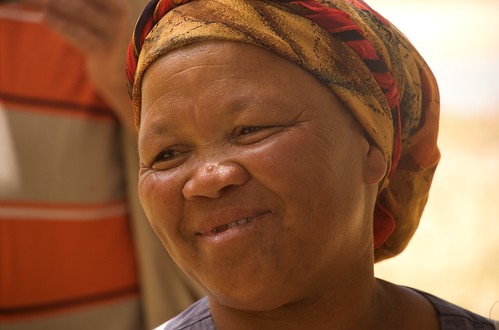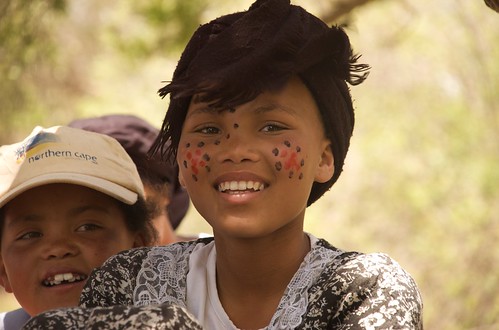 For thousands and thousands of years the Nama people of Southern Africa maintained a nomadic pastoral way of life, tending their flocks of goats and sheep, gathering firewood, and collecting wild honey. Driving along the dirt roads surrounding Richtersveld National park you can still see the same lifestyle, supplemented by some modern conveniences like butane lanterns and plastic tarps.
For thousands and thousands of years the Nama people of Southern Africa maintained a nomadic pastoral way of life, tending their flocks of goats and sheep, gathering firewood, and collecting wild honey. Driving along the dirt roads surrounding Richtersveld National park you can still see the same lifestyle, supplemented by some modern conveniences like butane lanterns and plastic tarps.
Nama Iharu oms (huts) in the Richtersveld.
Land sovereignty has been a historic struggle for the Nama people. When Namibia – where the majority of Nama people then lived – was colonized by Germany, the Nama joined forces with the Herero and took up arms against their invaders from 1904 to 1907. This resulted in what today is called the Herero and Namaqua Genocide.
Herero people chained in 1904 by German troops.
According to the 1985 Whitaker Report on Genocide, an estimated 50 – 70% of all Herero people and 50% of all Nama people were killed. On the South African side of the border the Nama people were mostly left to their own as British and Afrikaner explorers searched for diamonds in the Northern Cape province. They continued their nomadic pastoral life with a policy of communal land ownership. Says Wikipedia: “Nama women still dress in Victorian traditional fashion. This style of dress was introduced by missionaries in the 1800s and their influence is still a part of the Nama culture today.”
You can see the influence in a video shot by Ray of a group of Nama youth performing an initiation dance, which marks young girls’ transition to adulthood.
Simon recorded a brilliant piece of audio of Cecilia, the mother of two of the young female dancers, singing a hymn in Nama.
Cecilia
Those British and Afrikaner explorers did in fact find their diamonds. Lots of them. In the 1920’s the South African state-owned mining company Alexkor evicted Nama residents from their diamond-rich land and began operations that would yield hundreds of millions of dollars to help support the country’s Apartheid regime. Since the end of Apartheid in 1994, however, new legislation allows communities to seek compensation for lost land and mineral wealth. The 3,700-strong Nama community launched their claim in 1998. Alexkor spent over a million dollars on legal costs, but in October 2003 the constitutional court ruled that the community was entitled to restitution, as well as to mineral rights. The court rejected their demand for a 90 percent equity stake in Alexkor, however, instead offering a 49% stake and a trust to benefit the Namaqualand community.
The Namaqua community now has more than $40 million coming its way. That is a big chunk of change for a group of 3,700 individuals. We had an opportunity to talk to local community leaders. I asked Leon Ambrosini, mayor of the Richtersveld municipality, how the money would be used, but he only answered in general terms.
My fear is that even with $40 million coming its way and a 49% stake in Alexkor, the quality of life and opportunities for those 3,700 Nama people will not improve much over the next ten years.
“We don’t want to get rich quick. We are solely thinking about the long term future for us and the children who will come after us,” said Floors Strauss, secretary of the Richtersveld Community Property Association, which will manage the $40 million. But I saw little evidence that the right investments are being made for sustainable development.
Nama girl from Port Nolloth.
I asked if there were any plans to build a college or university in the area, but there are none. (The entire province is without tertiary education.) The only specific expense we heard about was a $300 handout to each of the 3,700 represented in the court case. Which brings up some interesting questions: what if the money gets squandered? What if Alexkor becomes less profitable, jobs are lost, and the Nama people are actually worse off ten years from now than they are today? Land restitution in Zimbabwe, for example, is largely responsible for today’s shortage of food there as fleeing White farmers took off without transferring their agricultural skills.
My hope, obviously, is that in Richtersveld the right skills will be transferred to the Nama community so that they can manage their own development as they see fit. But to do so, I believe, will require an investment in education that community leaders don’t seem too concerned about. I’ll be keeping my eye on how things develop.
Extra bonus: Check out Lova’s summary of a fascinating conversation about land sovereignty and economic development in the Malagasy blogosphere. (The deal was later rejected.)

David Sasaki is the Director of Rising Voices, a global citizen media outreach initiative of Global Voices Online.
He manages a portfolio of small-scale projects around the developing world that use citizen media to effect social change.
Prior to his current focus on outreach, he served as Global Voices’
Latin America Regional Editor, monitoring the Latin American blogosphere, highlighting key content and translating select posts from Spanish to English.
Sasaki transitioned into online journalism after working as a freelance
web developer and English instructor in Monterrey, Mexico. He now splits his time and residence between North and Latin America and writes frequently at Rising Voices, Online. He manages a portfolio of small-scale projects around the developing world that use citizen media to effect social change.
Prior to his current focus on outreach, he served as Global Voices’
Latin America Regional Editor, monitoring the Latin American blogosphere, highlighting key content and translating select posts from Spanish to English.












